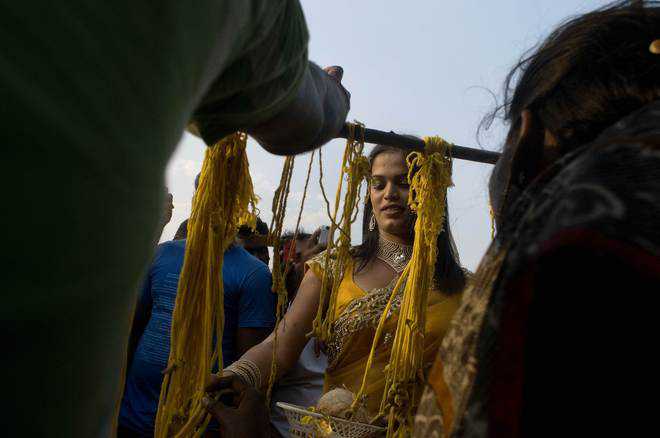
Less human: Madhu, ‘a thing in a sari’, is stronger in spirit than a man, more compassionate than a mother
Priyanka Singh
Away from the genteel confines of a city, but conveniently tucked well within it, is the red light area, where the screams of its occupants disintegrate on collision with the shield around honourable people; the cries never penetrating their armoured souls. Once inside this den of sin and depravity, the steps lead only one way — deeper into the muck. A murderer has a fairer chance of reclaiming his life, not a woman who has sold her body, not a hijra who services clients, not a Gurumai who takes into her fold nature’s freak children discarded by their parents. They are society’s filth, rightly damned.
And their agony has an address — Kamathipura, Mumbai.
Madhu, born to a professor, is trapped in a boy’s body. Gay may have been somewhat better, but he is a eunuch, destined to belong neither to his world nor theirs — ‘a nameless, past-less creature unable to find a way out’.
He aches for his father’s love and acceptance, instead, he cringes when Madhu’s hand innocently brushes his. The arrival of his ‘normal’ baby brother takes away the morsel of affection that came his way.
An encounter with Gurumai changes his life’s course. Did she set him free by castrating him or sealed his fate, is a truth Madhu will struggle with. Now a ‘she’, Madhu is soon into the business of sex. She gets to choose her first man, the gentle Gajja. Their romance blooms into real friendship in her arid life; a man making a ‘broken object feel human’.
Into her thirties, she decides to put a stop to the body business, knowing the humiliation that will follow. Her locks are lopped off. She is now allowed to be a badhai hijra and later condemned to beg. How do people view her, she wonders. Perhaps a man would wish to use a bug spray on her, ‘watch her wriggle to the ground in squeaky spasms until she stopped moving’.
Past 40, her beauty having ebbed, Gajja is the only constant. Her restlessness grows, having failed to completely extract herself from her old life. She’d stand for hours on a bridge for a fleeting glimpse of her now aged father, and brother. Perhaps her parents missed her, would accept her. Naively she imagines she could be both an uncle and aunt to her brother’s children; ‘use her hands to create something that would nourish another human being’. Hope can be cruel, she will learn.
Many, many years have passed. Summoning scraps of her belief, she heads for home. Will her mother recognise her? One feels the wrench when her mother places a five-rupee coin in her palm. Forsaken once again.
With the coming of a ‘parcel’, Madhu will break up inside once more and become whole. A child (now nothing more than an object) must be taught ‘how to forget she was human’, be protected from violence (for, who’d want to sleep with a loony) and prepare her to be ravaged, again and again, with least resistance. Madhu believes sometimes life offers a ‘lesser version of a dream’; she grabs it.
She knows there are no answers: ‘Why, why, why...If you said it long enough, or loud enough… you could see the ridiculousness of the question’.
But Madhu redeems herself, and how.
The book evokes gross revulsion — not for the sex workers, not for the wasted ‘pojeetives’, not for the naked power game, or land sharks eyeing brothels; but for every ‘normal’ man who turns away from his child, for every woman responsible for the ‘whimpering and rotting of their own fledglings’; bile rises for a soulless society that creates conditions where a child, on being asked to write ‘canal’ on the blackboard, instead writes ‘I am sorry’ for what he is. Like Gurumai says the Third World is not a place, it is a gender.
Madhu, ‘a thing in a sari’, is stronger in spirit than a man, more compassionate than a mother. Gurumai, well into her eighties, won’t hear of selling her brothel — ‘where will my children go to die?’ Who then is more human?
The book haunts and taunts. A free camp will talk of saving birds, but young prostitutes must resign to a futureless future. Hardcore real, the book doesn’t read like fiction. Somewhere, an unsuspecting parcel, plucked from home, is being readied for breaking. No one will save her from the fate of a rag doll. It doesn’t get more real.



























